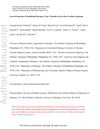De Novo Single-Nucleotide and Copy Number Variation in Discordant Monozygotic Twins Reveals Disease-Related Genes
March 2019
in “
European Journal of Human Genetics
”
whole-exome sequencing copy number variation de novo variant PLCB1 MT-ND5 ALS ARHGAP11B schizophrenia schizotypal personality disorder RASD2 CNV duplication CD38 autism spectrum disorder AADAC Tourette's syndrome genetic mechanisms phenotypic discordance MZ twins variable penetrance expressivity epigenetic factors

TLDR The research found genetic differences in identical twins that could explain why one twin has a disease while the other does not.
The study conducted whole-exome sequencing and copy number variation analysis on 26 individuals from 13 monozygotic twin pairs discordant for various diseases. It identified several genetic differences potentially related to the discordance, including a de novo variant in PLCB1 linked to lactase non-persistence, a variant in MT-ND5 associated with ALS, and a rare deletion in ARHGAP11B in twins with schizophrenia or schizotypal personality disorder. Additionally, a de novo variant in RASD2 and a CNV duplication in CD38 were found in twins with autism spectrum disorder, and a paternally inherited variant in AADAC was identified in twins discordant for Tourette's syndrome. The study suggests that de novo genetic mechanisms may contribute to disease onset and that phenotypic discordance in MZ twins could be due to a common variant with variable penetrance or expressivity, potentially influenced by other genetic or epigenetic factors. However, the study did not perform functional validation of the variants, which is a limitation.



